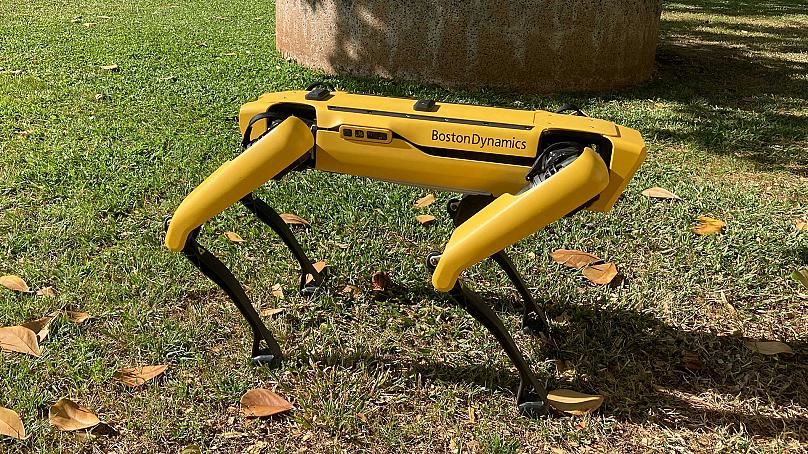
Robot police dogs: Just a tool or something more sinister?
Homeless residents of a state-run tent city in Honolulu, Hawaii, are having their eyes scanned by a robotic police dog.
Police in the city say it's a safer way to check for symptoms of COVID-19.
But local civil rights advocates say the use of the robot – called Spot – dehumanises some of Honolulu's most vulnerable residents.
"Because these people are houseless it’s considered OK to do that,” said Jongwook Kim, legal director at the American Civil Liberties Union of Hawaii. “At some point it will come out again for some different use after the pandemic is over".
'COVID safe'
Acting Lt. Joseph O’Neal of the Honolulu Police Department’s community outreach unit defended the robot’s use in a media demonstration earlier this year.
He said it had protected officers, shelter staff and residents by scanning people’s body temperatures at a shelter where they could quarantine and get tested for COVID-19.
The robot is also used to remotely interview individuals who have tested positive for the virus.
"We have not had a single person out there that said, ‘That’s scary, that’s worrisome,’" O’Neal said. "We don’t just walk around and arbitrarily scan people".

Police use of such robots is still rare and largely untested — and hasn’t always gone over well with the public.
Honolulu officials faced a backlash when a local news organisation, Honolulu Civil Beat, revealed that the Spot purchase was made with federal relief money.
Public outcry in New York
Late last year, the New York Police Department started using Spot after painting it blue and renaming it "Digidog". It went mostly unnoticed until New Yorkers began spotting it in the wild and posting videos to social media.
Shortly afterwards, the department returned the robot to its manufacturer.
"This is some Robocop stuff, this is crazy," was the reaction in April from Democratic congressman Jamaal Bowman.
He was one of several New York politicians to speak out after a widely shared video showed the robot strutting with police officers responding to a domestic-violence report at a high-rise public housing building in Manhattan.
Days later, after further scrutiny from elected city officials, the department said it was terminating its lease and returning the robot.
The expensive machine arrived with little public notice or explanation, public officials said, and was deployed to already over-policed public housing. Use of the high-tech canine also clashed with Black Lives Matter calls to defund police operations and reinvest in other priorities.
In the aftermath of the fiasco, Boston Dynamics, the company that makes the robots, Boston Dynamics, said it needed to do a better job of explaining the technology to the public and customers who have had little experience with it.
'Just a tool'
For the Dutch national police, one of the company’s customers, explaining the technology includes emphasising that Spot is a very good robot — well-behaved and not so smart after all.
"It doesn’t think for itself," Marjolein Smit, director of the special operations unit of the Dutch national police, said of the remote-controlled robot. "If you tell it to go to the left, it will go to the left. If you tell it to stop, it will stop".
Earlier this year, her police division sent its robot into the site of a deadly drug lab explosion near the Belgian border to check for dangerous chemicals and other hazards.
According to Boston Dynamics, its acceptable use guidelines prohibit Spot’s weaponisation or anything that would violate privacy or civil rights laws, which it said puts the Honolulu police in the clear ethically.
It's all part of a year-long effort by the company, which in the past relied on military funding, to make its robots seem friendlier and thus more palatable to local governments and consumer-oriented businesses.
Military-grade
By contrast, a lesser-known rival, Philadelphia-based Ghost Robotics, has no qualms about weaponisation and supplies its dog-like robots to several branches of the US military and its allies.
"It’s just plug and play, anything you want," said Ghost Robotics CEO Jiren Parikh, who was critical of Boston Dynamics’ stated ethical principles as "selective morality" because of the company’s past involvement with the military.
Parikh added that his company doesn’t market its four-legged robots to police departments, though he said it would make sense for police to use them.
"It’s basically a camera on a mobile device," he said.
There are roughly 500 Spot robots now in the wild. Perry said they're commonly used by utility companies to inspect high-voltage zones and other hazardous areas. Spot is also used to monitor construction sites, mines and factories, equipped with whatever sensor is needed for the job.
It’s still mostly controlled by humans, though all they have to do is tell it which direction to go and it can intuitively climb stairs or cross over rough terrain. It can also operate autonomously, but only if it’s already memorised an assigned route and there aren’t too many surprise obstacles.
Should the police have robots?
"The first value that most people see in the robot is taking a person out of a hazardous situation," Michael Perry, vice president of business development at Boston Dynamics, said.
Kim, of the ACLU in Hawaii, acknowledged that there might be many legitimate uses for such machines, but said opening the door for police robots that interact with people is probably not a good idea.
He pointed to how Dallas police in 2016 stuck explosives on a wheeled robot to kill a sniper, fueling an ongoing debate about "killer robots" in policing and warfare.
"There’s the potential for these robots to increase the militarization of police departments and use it in ways that are unacceptable," Kim said.
"Maybe it’s not something we even want to let law enforcement have".











